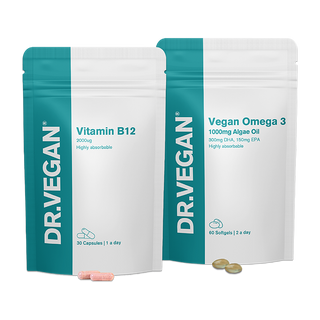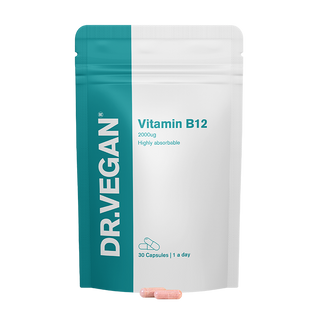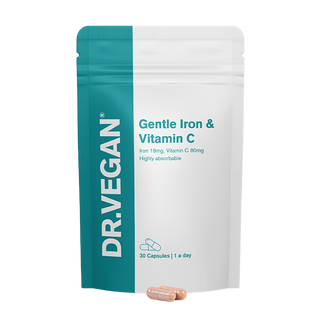Common Vegan Deficiencies & Symptoms

It is possible to be vegan and healthy. However, whether you've reduced your meat intake or you follow a completely vegan diet, it's important to ensure optimal health through your diet and lifestyle and be mindful of common nutrient deficiencies that can arise through the food choices you make. Debunked: the most common misconceptions about plant-based diets.
What Vitamins are Vegans Missing?
If you're unsure what nutrients your diet provides, and what your diet may be missing, create your free Diet Profile, created by expert nutritionists, for a 'window into your diet'.

See what your diet is missing - create your free Diet Profile.
Common Deficiencies in Vegan Diets
Our team of nutritionists explore the most common nutrient deficiencies that can arise as a result of vegan, plant-based and vegetarian diets, and importantly what you can do to avoid them.
Vitamin B12 Deficiency
A B12 deficiency can cause all sorts of problems with the body. The most obvious ones will be tiredness, fatigue, B12 deficiency anaemia, low immunity and reduced brain function and low moods. Other symptoms which may be discovered after investigation including high Homocysteine levels which is linked with blood clots.
As Vitamin B12 is only found in animal foods, taking a vegan Vitamin B12 supplement is recommended if you're following a vegan or plant-based diet.
Vitamin A deficiency
Vitamin A deficiency can cause vision loss, skin issues and blemishes, and low immunity. Make sure you reach for foods such as sweet potatoes, tomatoes, red bell peppers and leafy green vegetables which are all high in Vitamin A. You can also find Vitamin A in our award-winning Daily Multi-Vitamin, also voted Best Daily Multivitamin for vegans by Choose Veganism.
Vitamin D deficiency
Vitamin D is an essential nutrient for bone health, immunity and brain health. A deficiency can contribute to weak bones, low immunity, inflammatory conditions and low moods. Learn more about how you know if you're deficient in Vitamin D.
Vitamin D is only found in a small number of foods, which is why a vegan Vitamin D3 supplement, or a vegan Daily Multivitamin containing Vitamin D3 are common choices among vegans.
The most common sources of Vitamin D are foods of animal origin, such as oily fish, meat and egg yolks, however some foods that are easily found in supermarkets are fortified with Vitamin D, such as breakfast cereals and plant milk alternatives. You may enjoy reading 'What is the best plant-based milk?'.
Calcium deficiency
A deficiency in Calcium may cause weak bones and teeth and insufficient digestive enzymes.
Women going through menopause are particularly at risk of losing bone density - learn more in about why bone health is so important in menopause. Calcium doesn’t necessarily need to come from dairy products as most people think - there are plenty of plant-based calcium sources that don’t come from animals including beans, chickpeas, sesame seeds, dried figs and almonds. That said, taking calcium in a bone supplement, with supporting nutrients, should also be taken to ensure you don't build up an deficiencies in calcium.
Vegan Calcium Deficiency Symptoms
You might notice brittle nails, muscle cramps, or dental problems if your calcium levels are too low – all signs that your bones and body need more support.
Iron deficiency
Iron deficiency can cause anaemia, fatigue, hair loss, low immunity and cognitive impairment. Good plant sources of Iron include wholegrains, dried fruits such as figs and apricots, green leafy vegetables, nuts and seeds. Not being aware of Iron-rich foods is one of our big mistakes to avoid on a plant-based diet. You may also enjoy learning about why Iron is so important, particularly for women.
Vegan Iron Deficiency Symptoms
Iron deficiency can lead to tiredness, pale skin, shortness of breath, or feeling faint, especially during physical activity or after standing up quickly.
Address Common Vegan Deficiencies and Symptoms
Staying on top of your nutrient intake is key to thriving on a vegan or plant-based diet. While many deficiencies can be avoided with good planning and a varied diet, some nutrients – like Vitamin B12, Iron, Vitamin D and Omega-3 – can be more difficult to get from plant foods alone. That’s where smart supplementation can really make a difference.
Wondering if you should take a daily multi-vitamin? You may be interested in reading our latest Daily Multi-Vitamin customer survey, including the benefits of daily multi-vitamins, how to tell if your daily multi-vitamin is good and the best type of daily multi-vitamin to take.
Discover our range of vegan probiotics, vitamins and supplements.
What to hear more from our nutritionists? Sign up to our newsletter for free expert tips and advice:



















